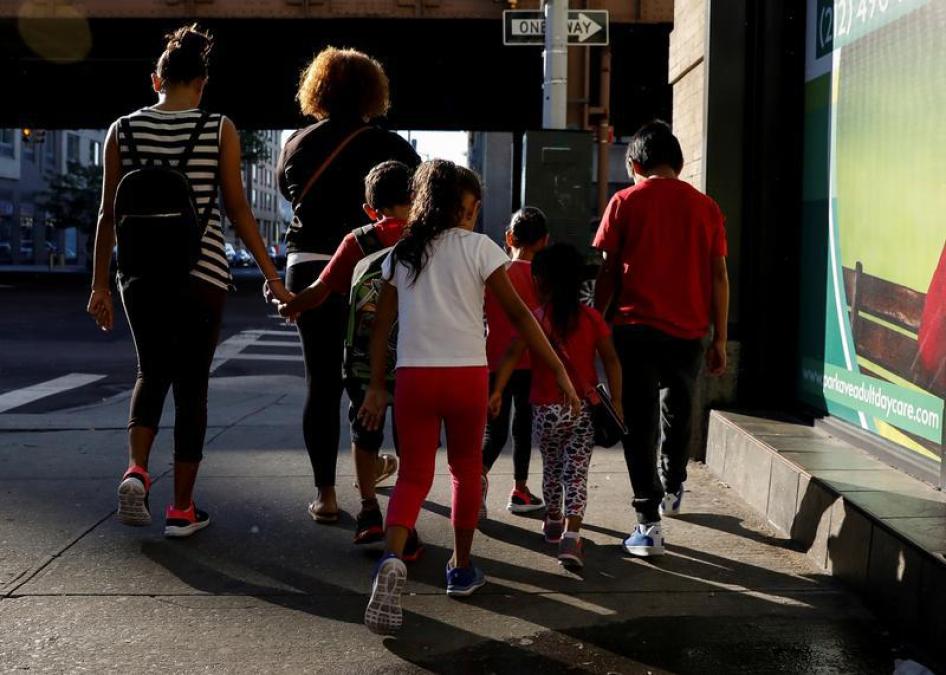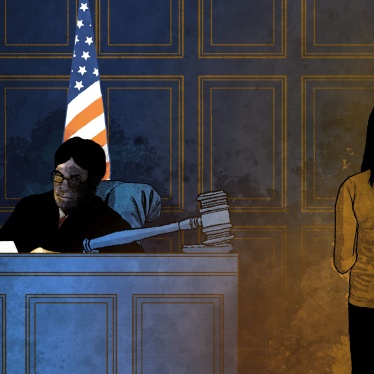(Washington, DC) – The United States government is not likely to comply with a second court-ordered deadline of July 26, 2018, to reunify migrant families forcibly separated at the border, Human Rights Watch said. Only about half of the more than 2,500 families forcibly separated as a consequence of the Trump administration’s “zero tolerance” policy are expected to be reunited by the deadline, leaving hundreds subject to unexplained delays. These unconscionable delays are causing severe harm to children and families.
A dozen parents and separated children interviewed at the border and in Honduras by Human Rights Watch in recent weeks described weeks of agony and despair. Parents report being unable to speak to their children, or only being able to speak briefly if they could pay for calls. In some cases, parents spent weeks without knowing where their children were; in other cases, they were deported alone with no information about their separated children, who remained in the US. Some parents said that immigration officials induced them to waive their rights, including to seek asylum, telling them it was the only way, or the fastest way to be reunited with their children. Even for those who have been reunified, the harm to children and family relationships may be severe and lasting.
“Each moment of delay in reunifying these families compounds the extreme harm of ripping them apart,” said Michael Bochenek, senior counsel in the children’s rights division at Human Rights Watch. “The US government does not appear to be taking seriously its responsibility to immediately address the enormous damage it has caused and is still causing.”
“Pablo Z.,” who asked to be identified by a pseudonym, was deported alone to Honduras without his 4-year-old. He told Human Rights Watch he could not communicate with his son for two weeks after they were forcibly separated. One week after his deportation, he finally spoke to his son. “He said he didn’t want to talk to me because he said I left him there,” Pablo said. “When he says this, it makes me cry. I can’t speak. I just want to see him and hug him.”
Lawyers for the Trump administration told a federal court on Monday it had reunited 879 parents with their children so far and another 538 parents had been cleared for reunions and were awaiting transportation. The government also reported that 463 parents of migrant children are “no longer present” in the US, meaning that they may have been deported or departed the country after signing a “voluntary” return agreement.
The government missed an earlier court deadline to reunify all children under age 5 with their parents. By July 12, two days after the deadline, the government had reunified 57 out of 105 young children with their parents.
Detained parents and separated children told us they could only speak if they could afford the sometimes high cost of detention center phone calls (for example, a call can cost upwards of US$5 for 10 minutes, which is unaffordable for some parents). Until July 13, parents were also asked to pay for the cost of their children’s transport, lawyers with the Texas Civil Rights Project told Human Rights Watch. Those costs were $1,900 in one case documented by the American Civil Liberties Union.
“I can only talk to my dad when he can call from detention but the amount of time we can talk is very short,” a separated 11-year-old told Human Rights Watch. “Sometimes the phone cuts off, I think because he runs out of money to pay for the call. I’m so scared they will deport him and I’ll be here alone.”
Some parents told Human Rights Watch they agreed to deportation because officials told them they would be deported with their child or pressured them to waive their right to seek asylum in exchange for reunification.
Coercive treatment by officials should be promptly and thoroughly investigated and agents found to have misled or coerced separated parents or children should be held accountable, Human Rights Watch said.
Federal judges have temporarily blocked the deportation of separated and recently reunited families, including in a nationwide order issued July 16. Another court order requires the government to present a plan “for addressing the children’s trauma as a result of the Government’s unconstitutional separation of the children from their parents.”
Instead of forcibly separating families, the Trump administration hopes to detain families together until their immigration cases, including any asylum claims, are resolved. This would run afoul of US legal requirements generally limiting the detention of families to 20 days.
Children, whether unaccompanied or as members of a family, should not be held in immigration detention, Human Rights Watch said. Government health experts have warned that detaining migrant families poses a “high risk of harm” to children, in particular because of the trauma they have already suffered because of forced family separation. Family separation as well as family detention has devastating and long-lasting consequences, particularly when it is prolonged or indefinite, as Human Rights Watch has previously found. The adverse impact of detention is even more pronounced for children who have fled death threats, violence, or other serious harm.
The US government should fairly assess each individual’s claim to asylum, as required under US and international law. Detained families should be released, using the least restrictive alternatives to detention that will ensure court appearances, and authorities should move swiftly to end coercive tactics by immigration officials, provide remedies to families harmed due to separation, and reunite the thousands of children still separated from their parents, including parents already removed from the country.
“Detaining families just replaces one harm with another,” said Clara Long, senior researcher in the US program at Human Rights Watch. “The government should embrace compassionate, dignified, and effective alternatives to detention, and invest in a fair and timely immigration adjudication system.”
US immigration authorities have separated over 2,500 families, most of whom crossed the border somewhere other than at a regular “port of entry,” or an official border crossing. In an attempt to explain the separations, authorities cited the need to criminally charge the parents for “improper entry,” due to the Trump administration’s “zero tolerance” policy. First-time offenses typically result in a conviction with no fine and no jail time other than the time already spent in immigration detention.
The parents and children interviewed by Human Rights Watch said they either presented themselves at a port of entry or turned themselves in to immigration officials immediately after entering the United States irregularly, in many cases explaining that they had fled death threats or other harm in their home countries. International law prohibits imposing penalties such as criminal prosecution on asylum seekers for improper entry. US law requires border officials to properly assess the asylum claims of individuals even if they enter the country irregularly. US law also permits asylum seekers to present themselves anywhere in the US, including at an official port of entry, but US immigration officials have turned away asylum seekers who seek to enter through these channels, making them endure long, anxious waits of days, even weeks, often in lawless northern Mexican border towns. According to the New York Times, senior officials in the Department of Homeland Security are considering a plan to close ports of entry entirely to asylum seekers, only allowing applications for protection from abroad.
Wrenching separations, official lies, and intimidation
The parents and children Human Rights Watch spoke with described wrenching separations from their family members, often finding these moments of trauma painful to recall:
- “The agents told us our children would be waiting for us when we returned from court,” said Jessyca N., from El Salvador, interviewed in the Port Isabel immigration detention center, Texas, July 12, 2018.
- “When they took us to court, they said we would see our kids right afterward. I thought I would come right back and see my son again. When we realized we weren’t going back to where our children were, we all started crying and pleading,” said Edwin H., age 45, from Honduras, interviewed in the Port Isabel immigration detention center, Texas, July 16, 2018.
- “They took me away from my son when we were in the hielera [meaning “freezer,” the name given to a Border Patrol holding cell, which generally are kept very cold]. They said I had to go to court and would see my son right after. I haven’t seen him since,” said Héctor G., age 28, from El Salvador, forcibly separated from his 6-year-old son on June 12, interviewed in the Port Isabel immigration detention center, Texas, July 12, 2018.
- Rolando B. and his son, Johan, then 11 months old, crossed the border into Texas on March 16 and turned themselves in to the Border Patrol. They were held for four days together in the chain link cages of a Border Patrol detention facility in McAllen, Texas. On the fourth day, an intimidating officer wearing an ICE T-shirt told Rolando to hand over his child. “He said, ‘Say goodbye to your son, because you’re not going to see him anymore,’” Rolando told Human Rights Watch when we spoke to him in San Pedro Sula on July 20, 2018.
- “They came into the cell where I was with my son and they told me they were taking my son,” said Pablo Z., who also said he was separated from his 4-year-old son after entering at a port of entry into the US. “He started to cry, and I did too. He started to yell and said, ‘Papa, don’t leave me.’ The officer tried to grab him, but my son grabbed on to my leg and cried. So, I said I would carry him. I took him out to a car and put him in. This is the worst thing that has ever happened to me,” said Pablo Z., interviewed in Yoro, Honduras, July 19, 2018.
- “After two days a guard came and called my name. He said come with him. When I asked why, he said so I could shower in another center. I asked if I could see my father and say goodbye and he said no and kept walking. They put me in a van and took me to another detention center,” said Eduardo M., an 11-year -old from Guatemala, interviewed in Texas on July 13, 2018.
Ongoing trauma compounded by insufficient communication
Parents interviewed by Human Rights Watch described very limited contact with their children, often just phone or video calls once a week for 10 minutes at a time. Many went for a week or longer without any word about where their children were or how they were doing. For example:
- Edwin H., detained in the Port Isabel immigration detention center, spoke to his 11-year-old son twice between June 11 and July 16. “I tried to call the number they gave me maybe five other times, but there was no answer,” he told us.
- Aurelio L., a Honduran man who was also detained in Port Isabel and interviewed on July 16, 2018, had spoken to his 10-year-old son once in the 33 days since they were forcibly separated.
- Jessyca N., from El Salvador, told us she was not able to speak to her 9-year-old daughter for six days after they were forcibly separated in McAllen on June 14.
- Héctor G. had no word on his 6-year-old son’s whereabouts or well-being for 20 days, until a guard in the Port Isabel detention center handed him a phone number on a slip of paper, without explanation. “Until then, I had no idea what had happened to him,” he told Human Rights Watch.
- “We couldn’t see him on his first birthday,” Rolando B., who was separated from his 1-year-old child for over four months after being deported to Honduras without the child, said. “We can only talk to him via video once a week for 20 minutes. It’s so painful.”
- A lawyer representing several other parents in the Port Isabel immigration detention center told Human Rights Watch that they had only spoken to their children once or twice during the month they had been in detention. “They didn’t have the money to make the calls. When we figured that out, we put money on their accounts so they could get in touch with their children,” the lawyer said.
- A lawyer representing a father and his 10-year-old son who had just been reunited after a month apart told Human Rights Watch, “The son isn’t doing well. He’s not talking. He’s having a very difficult time adjusting after the separation.”
Pressure to accept deportation
Several parents told Human Rights Watch that immigration officials urged them to accept “voluntary” return to their home countries or to waive their right to pursue an asylum claim. For example:
- Edwin H., from Honduras, told Human Rights Watch, “An official gave me the results of my interview [an initial credible fear interview, the first stage in pursuing an asylum claim]. He pointed to a box and told me to mark it and sign the form. I said I wasn’t going to sign it because I didn’t know what I was signing. He got angry. ‘You have to sign. You don’t want to have your son back?’ Under that pressure, I signed. I didn’t understand it because it was all in English.” Human Rights Watch examined the document he signed, in which he waived the right to see an immigration judge to explain the reasons why he feared returning to his home country.
- Pablo Z., also from Honduras, was deported alone without his 4-year-old son. He told Human Rights Watch he and his son had presented themselves at the port of entry in Brownsville, Texas, on June 11, 2018. “We were held for two days at the bridge. On the first day, the officers there asked me why I came to the United States. I told them I was coming to ask for asylum for me and my son and that I was afraid of returning to my country. I told them that we had both been threatened by a narco-trafficker. They told me to sign some papers, but I didn’t know what they were. They told me that the papers weren’t a deportation, so I signed them.” Pablo told us he never spoke with another official further about his claim of fear before being deported without his son a week later.
Other parents said the separation from their children left them unable to focus on their immigration cases, despite officials’ insistence that they continue through adjudication procedures:
- “The officials told me I would have to do an interview in the next few weeks. I want to have this interview, but right now all I can think about is how my daughter is and when I’ll see her. It’s not right to make me do that interview now because I can’t focus. I’m just thinking about my daughter,” said Jessyca N., from El Salvador.
- When Ariel P., from Guatemala, had a credible fear interview in a San Antonio detention center, he had not spoken to his son in more than 20 days and had not been told where his son was. He said the forced separation and uncertainty left him despondent and affected his ability to concentrate on his interview. “All I could think about was how he was and when I would see him again. Every night when I went to sleep, I would think about where he was sleeping. At every meal, if there was some food I didn’t like, I would wonder if he was eating food he didn’t like. If I didn’t eat and felt hungry, I would wonder if he was also hungry that day. I kept returning to these thoughts, and it was impossible for me to focus on anything else,” he told Human Rights Watch.








